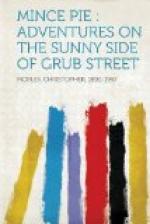It was a soft spring afternoon, the garden was thronged with visitors and all the indoor animals seemed to be wondering how soon they would be let out into their open-air inclosures. We filed through the wicket gate and the Urchin disdained the little green go-carts ranked for hire. He preferred to navigate the Zoo on his own white-gaitered legs. You might as well have expected Adam on his first tour of Eden to ride in a palanquin.
The Urchin entered the Zoo much in the frame of mind that must have been Adam’s on that original tour of inspection. He had been told he was going to the Zoo, but that meant nothing to him. He saw by the aspect of his curators that he was to have a good time, and loyally he was prepared to exult over whatever might come his way. The first thing he saw was a large boulder—it is set up as a memorial to a former curator of the garden. “Ah,” thought the Urchin, “this is what I have been brought here to admire.” With a shout of glee he ran to it. “See stone,” he cried. He is an enthusiast concerning stones. He has a small cardboard box of pebbles, gathered from the walks of a city square, which is very precious to him. And this magnificent big pebble, he evidently thought, was the marvelous thing he had come to examine. His custodians, far more anxious than he to feast their eyes upon lions and tigers, had hard work to lure him away. He crouched by the boulder, appraising its hugeness, and left it with the gratified air of one who has extracted the heart out of a surprising and significant experience.
The next adventure was a robin, hopping on the lawn. Every child is familiar with robins which play a leading part in so much Mother Goose mythology, so the Urchin felt himself greeting an old friend. “See Robin Red-breast!” he exclaimed, and tried to climb the low wire fence that bordered the path. The robin hopped discreetly underneath a bush, uncertain of our motives.
Now, as I have no motive but to attempt to record the truth, it is my duty to set down quite frankly that I believe the Urchin showed more enthusiasm over the stone and the robin than over any of the amazements that succeeded them. I suppose the reason for that is plain. These two objects had some understandable relation with his daily life. His small mind—we call a child’s mind “small” simply by habit; perhaps it is larger than ours, for it can take in almost anything without effort—possessed well-known classifications into which the big stone and the robin fitted comfortably and naturally. But what can a child say to an ostrich or an elephant? It simply smiles and passes on. Thereby showing its superiority to some of our most eminent thinkers. They, confronted by something the like of which they have never seen before—shall we say a League of Nations or Bolshevism?—burst into shrill screams of panic abuse and flee the precinct! How much wiser the level-headed Urchin! Confronting the elephant, certainly an appalling sight to so small a mortal, he looked at the curator, who was carrying him on one shoulder, and said with an air of one seeking gently to reassure himself, “Elphunt won’t come after Junior.” Which is something of the mood to which the Senate is moving.




